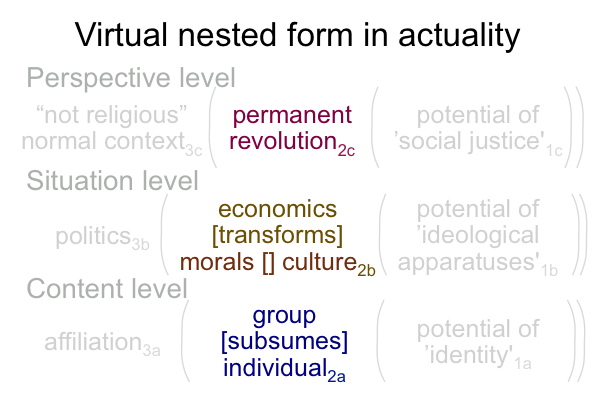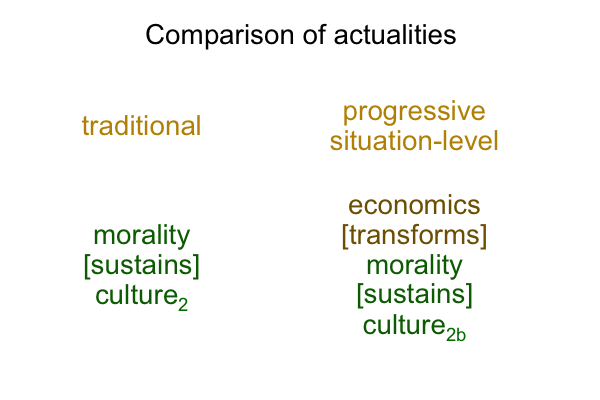0019 At this juncture, I stand at the threshold of the section titled, “Progressive Depersonalization”.
Michaud claims that the progressive agenda depersonalizes the individual. He starts with the ironic, progressive slogan: The personal is the political.
0020 In order to appreciate this slogan, I start with the virtual nested form in the realm of actuality. A virtual nested form is a feature of a three-level interscope. It consists of a column in one of the three elements.
Here is a picture of the virtual nested form in the realm of actuality for the progressive interscope.

0021 This virtual nested form may be spoken as follows.
The normal context of permanent revolution2c virtually brings the dyadic actuality, economics [transforms] morals & culture2b, into the potential of group [subsumes] individual2a.
This nested form operates as a demiurge. A demiurge is a gnostic divinity that is forever building its world. It is typically opposed to another demiurge that is forever building an opposite world. So, it is always one demiurge against another.
0022 Of course, I can easily guess the identity of the opposing demiurge.
The opposing demiurge is the one that victimizes individuals who do not conform to morality or culture, thereby inspiring them to identify with a victim group.
Here is a comparison of the actuality2 of the traditional slogan and the actuality2b of the situation-level of the progressive agenda.

0023 Clearly, economic intervention2b is a tool for the permanent revolution2c to use, in order to transform the ways that traditional morality sustains culture2b.
Also, of all the groups that subsume the individual2a, none can involve traditional morality and culture2.
0024 Why?
In Christian morality, the individual is called into mystical union with Jesus Christ, one of the three Persons of the Triune Godhead. So, the “group2a” is actually the divine oikos, or the economy of God. This is discussed in the second interlude in How To Define the Word “Religion”.
The individual2a does not adopt an identity1a. The individual2a becomes an identity1a.
0025 What is identity1a?
Ah, in the Christian schema, identity1a is the person that I call “me”. It1a is not a group2a affiliation3a.
In Jungian terminology, the assumption of the individual into the divine oikos is called, “individuation”. It is not called, “subsumption”.
0026 So, Michaud is on target in claiming that the progressive agenda depersonalizes the individual.
It does so by re-defining the word, “identity”.
In the progressive ideation, identity1a is the potential underlying group affiliation3a and supports the subsumption of the individual into a political group2a.
The personal2a is subsumed into the political2a.
